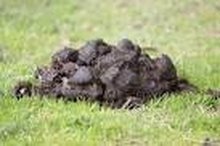The gunshot method of deworming may soon be gone. What you don't know might hurt your horses(s) if they are harbouring worms that are resistant to the drugs you are deworming with.

Manure - Key to better horse deworming practices
Without the fecal analysis, the horse owner is just guessing at both the need to deworm and the effectiveness of the product and may unconsciously be contributing to drug resistance.
Veterinarians and animal health companies are spending more time educating their clients about the growing resistance of parasites to anthelmintic drugs used in deworming.
Rather than deworming every horse, at every interval, a fecal egg count test will reveal which horses are carrying the higher strongyle parasite burdens. It is estimated that 80% of the eggs shed in to the environment come from 20% of the herd.
Parasitologists suggest the threshold for recommending treatment is typically a strongyle egg count above 200 eggs per gram of feces. Veterinarians and researchers are advocating a more targeted approach to treating the horses with such burdens.
The follow up fecal test, two weeks later, is just as important to be sure the drug administered was successful. If it was not effective; your veterinarian will be able to suggest a different anthelmintic to use.
Pyrantel and fenbendazole, are two drugs that have documentation from studies showing strongyle resistance, however if a fecal reveals good efficacy, they can still be effective to treat small strongyles.
Without the fecal analysis, the horse owner is just guessing at both the need to deworm and the effectiveness of the product and may unconsciously be contributing to drug resistance. Deworming a horse with low egg shedding, will do little to improve its health but it could contribute to the development of resistance to the deworming drugs.
Proper administration is also incredibly important. Knowing the horse's weight, selecting the correct dosage and making sure the correct amount of dewormer is completely consumed, are all necessary measures to ensure an effective administration and ultimately to take care of the worm burden.
Would you like a bag for that manure?
Collecting a sample for fecal analysis is an important part of equine parasite management and it is really quite easy. All you need is two zip lock bags and a magic marker.
Use one zip-lock bag turned inside out to pick up a good size sample of fresh feces. Turn the bag right side out and put it in another zip-lock bag labeled with the date and the horses name on it.
Get rid of as much air as possible in the bags before closing them. Give it to your veterinarian or lab for analysis within 48 hours. Store in a cool place like a fridge if you are not handing it over immediately. Freezing or heating can kill the parasites rendering the test inaccurate.
See The Equine Guelph how to video for collecting fecal samples https://www.youtube.com/watch?v=gxTWIz8i4e4&feature=youtu.be
Story compiled with references from: AAEP Parasite Control Guidelines Developed by the AAEP Parasite Control Subcommittee of the AAEP Infectious Disease Committee, Revised February 2016
Subcommittee members: Martin K. Nielsen, DVM, Ph.D., Dipl. EVPC (chair), Linda Mittel, MSPH, DVM, Amy Grice, VMD, Michael Erskine, DVM, Dipl. ABVP, Emily Graves, DVM, Dipl. ACVIM, Wendy Vaala, VMD, Dipl. ACVIM, Richard C. Tully, DVM, Dennis D. French, DVM, Ph.D, Dip. ABVP, Richard Bowman, DVM, Ray M. Kaplan, DVM, Ph.D, Dipl. ACVM, Dipl. EVPC. http://www.aaep.org/custdocs/AAEP%20Parasite%20Control%20Guidelines.pdf
